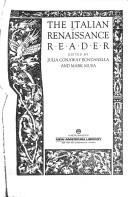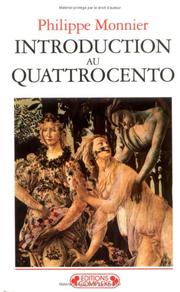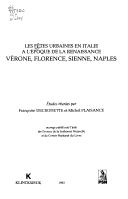| Listing 1 - 10 of 20 | << page >> |
Sort by
|
Book
ISBN: 2700306511 9782700306514 Year: 1989 Publisher: Paris : Arthaud,
Abstract | Keywords | Export | Availability | Bookmark
 Loading...
Loading...Choose an application
- Reference Manager
- EndNote
- RefWorks (Direct export to RefWorks)
Italy --- Italie --- Civilization --- Civilisation --- Italy - Civilization - 1268-1559 --- Art europeen --- Art italien --- 15e-17e siecles
Book
ISBN: 9782226246219 2226246215 Year: 2013 Volume: 61 Publisher: Paris : Albin Michel,
Abstract | Keywords | Export | Availability | Bookmark
 Loading...
Loading...Choose an application
- Reference Manager
- EndNote
- RefWorks (Direct export to RefWorks)
Une interrogation sur la construction du mythe de la Renaissance au XVe siècle. Les humanistes italiens ont pensé leur époque comme celle de la rupture avec le Moyen Age, notamment dans l'univers figuratif et les lettres. L'auteure présente le renouvellement culturel et la survivance des structures anciennes pour mieux faire apparaître les paradoxes qui caractérisent cette période.
Renaissance --- Italy --- Italie --- Civilization --- Civilisation --- Renaissance - Italy --- Italy - Civilization - 1268-1559
Book
ISBN: 8360183279 9788360183274 Year: 2006 Volume: 107 Publisher: Kraków: Polska akademia umiejętności,
Abstract | Keywords | Export | Availability | Bookmark
 Loading...
Loading...Choose an application
- Reference Manager
- EndNote
- RefWorks (Direct export to RefWorks)
Culture --- History --- Italy --- Poland --- Civilization --- Culture - History - Miscellanea. --- Italy - Civilization - 1268-1559. --- Italy - Civilization - 1559-1789. --- Poland - Civilization - 1500-1795.
Book
ISBN: 9781107003620 9781139051613 113905161X 1107003628 9780521177122 052117712X 1108505570 1108514510 9781108514514 Year: 2018 Publisher: New York, NY, USA
Abstract | Keywords | Export | Availability | Bookmark
 Loading...
Loading...Choose an application
- Reference Manager
- EndNote
- RefWorks (Direct export to RefWorks)
In this book, Christopher Celenza provides an intellectual history of the Italian Renaissance during the long fifteenth century, from c.1350-1525. His book fills a bibliographic gap between Petrarch and Machiavelli and offers clear case studies of contemporary luminaries, including Leonardo Bruni, Poggio Bracciolini, Lorenzo Valla, Marsilio Ficino, Angelo Poliziano, and Pietro Bembo. Integrating sources in Italian and Latin, Celenza focuses on the linked issues of language and philosophy. He also examines the conditions in which Renaissance intellectuals operated in an era before the invention of printing, analyzing reading strategies and showing how texts were consulted, and how new ideas were generated as a result of conversations, both oral and epistolary. The result is a volume that offers a new view on both the history of philosophy and Italian Renaissance intellectual life. It will serve as a key resource for students and scholars of early modern Italian humanism and culture.
Renaissance --- Italy --- Civilization --- Intellectual life --- Philosophy, Renaissance --- Renaissance - Italy --- Italy - Intellectual life - 1268-1559 --- Italy - Civilization - 1268-1559

ISBN: 0452008735 9780452008731 Year: 1987 Publisher: New York : New American Library,
Abstract | Keywords | Export | Availability | Bookmark
 Loading...
Loading...Choose an application
- Reference Manager
- EndNote
- RefWorks (Direct export to RefWorks)
Italian literature --- Italy --- Civilization --- Renaissance --- Italian literature - 15th century --- Italian literature - 16th century --- Italy - Civilization - 1268-1559 --- Italy - Civilization - 1559-1789

ISBN: 2870275862 9782870275863 Year: 1995 Volume: 93 Publisher: Bruxelles : Editions Complexe,
Abstract | Keywords | Export | Availability | Bookmark
 Loading...
Loading...Choose an application
- Reference Manager
- EndNote
- RefWorks (Direct export to RefWorks)
Geschiedenis van de nieuwe tijden --- Histoire des temps modernes --- Italie --- Italië --- Art, Italian --- Art italien --- Italy --- Civilization --- -Italy --- -Art, Italian --- Italy - Civilization - 1268-1559 --- CIVILISATION DE LA RENAISSANCE --- ITALIE
Book
ISBN: 9788878146723 8878146722 Year: 2013 Publisher: Sesto Fiorentino (FI) : All'Insegna del Giglio,
Abstract | Keywords | Export | Availability | Bookmark
 Loading...
Loading...Choose an application
- Reference Manager
- EndNote
- RefWorks (Direct export to RefWorks)
Excavations (Archaeology) --- Fouilles (Archéologie) --- Mediterranean Region --- Méditerranée, Région de la --- History --- Histoire --- Italy --- Antiquities --- Civilization --- Excavations (Archaeology) - Italy --- Italy - Antiquities --- Italy - Civilization - 476-1268 --- Italy - Civilization - 1268-1559
Book
ISBN: 9782503555584 2503555586 Year: 2015 Publisher: Turnhout Brepols
Abstract | Keywords | Export | Availability | Bookmark
 Loading...
Loading...Choose an application
- Reference Manager
- EndNote
- RefWorks (Direct export to RefWorks)
The relationship between early modern Italy and its medieval past has become the object of new interest and debate in art history. To a certain extent, other fields of scholarship, such as history, history of literature, and history of philosophy, have remained alien to the discussion. Yet, the emergence of the humanities as autonomous disciplines in the nineteenth century was predicated on the arduous and sophisticated scrutiny and re-thinking of the ‘divides’ in the history of western Europe and their hermeneutical validity. Articulating the division between ancient / medieval and medieval / Renaissance has been particularly important in this discourse. At present, although the interpretation of the medieval / Renaissance divide no longer rests on the oversimplifying binomial of continuity / discontinuity, the identification and assessment of what historically constitutes a break, a transition, a regression, or a novelty are still topics of contention and ambivalence.Remembering the Middle Ages in Early Modern Italy approaches these important interpretive issues through the fresh lens of case studies carried out by scholars from the diverse fields of history of art and architecture, history of literature, and philosophy. In these essays, the notion of ‘remembrance’ is examined and inflected in multiple ways: as memory and survival, as a process of distance and clarification, and as nostalgia, repudiation, and revival. Remembering the Middle Ages also offers an updated survey on the ways in which the medieval / Renaissance divide was originally constructed in the fifteenth and sixteenth centuries and subsequently interpreted from Jacob Burckhardt’s The Civilization of the Renaissance in Italy (1860) to the present day.
Renaissance --- Italian Medieval styles --- civilization --- History of civilization --- Art --- anno 1400-1499 --- anno 1500-1599 --- Italy --- Arts, Italian --- Arts italiens --- Italie --- Civilization --- Civilisation --- Civilization, Medieval --- History. --- Arts, Italian. --- Civilization, Medieval. --- Civilization. --- Renaissance. --- 1268-1559. --- Italy. --- Art, Italian --- History --- Art, Italian - History --- Renaissance - Italy --- Italy - Civilization - 1268-1559

ISBN: 2252028874 2878540522 9782252028872 Year: 1993 Volume: 39 Publisher: Paris Klincksieck
Abstract | Keywords | Export | Availability | Bookmark
 Loading...
Loading...Choose an application
- Reference Manager
- EndNote
- RefWorks (Direct export to RefWorks)
Cities and towns --- Renaissance --- Festivals --- -Civilization --- History --- Italy --- Civilization --- 78.24 --- Folklore --- anno 1400-1499 --- Cities and towns - Civilization - Italy --- Renaissance - Italy --- Festivals - - History - Italy --- -Italy - Civilization - 1268-1559 --- FLORENCE (ITALIE) --- VERONE (ITALIE) --- SIENNE (ITALIE) --- NAPLES (ITALIE) --- CARNAVAL --- HISTOIRE --- 15E SIECLE --- 16E SIECLE --- CONDITIONS SOCIALES --- 16E-17E SIECLES --- -Italy
Multi
ISBN: 0521405386 0521069661 0511895712 9780511895715 9780521405386 9780521069663 Year: 1992 Volume: vol 2 Publisher: Cambridge Cambridge University Press
Abstract | Keywords | Export | Availability | Bookmark
 Loading...
Loading...Choose an application
- Reference Manager
- EndNote
- RefWorks (Direct export to RefWorks)
This is a full-length study of the use of the dialogue form in Italy from the early sixteenth century until Galileo. Drawing on a wide range of sources, it examines the characteristics which determined the genre's unrivalled popularity in the period as a vehicle for polemic, debate, technical exposition and comic drama. More than simply an account of the development of an individual literary genre, however, the book is a contribution to the broader social and cultural history of the period. As representations of conversation, miniature dramas of persuasion, the dialogues of the Italian Renaissance constitute an extraordinarily rich - and largely untapped - source of information about the ideals and practice of communication in the early modern age.
Italian literature --- History of civilization --- Sociolinguistics --- anno 1500-1799 --- Italy --- Dialogues, Italian --- Renaissance --- History and criticism. --- Dialogues [Italian ] --- History and criticism --- 16th century --- 17th century --- Civilization --- 1268-1559 --- 1559-1789 --- Dialogues, Italian - History and criticism. --- Italian literature - 16th century - History and criticism. --- Italian literature - 17th century - History and criticism. --- Reniassance - Italy. --- Italy - Civilization - 1268-1559. --- Italy - Civilization - 1559-1789. --- Arts and Humanities --- Literature --- Italian dialogues
| Listing 1 - 10 of 20 | << page >> |
Sort by
|

 Search
Search Feedback
Feedback About UniCat
About UniCat  Help
Help News
News